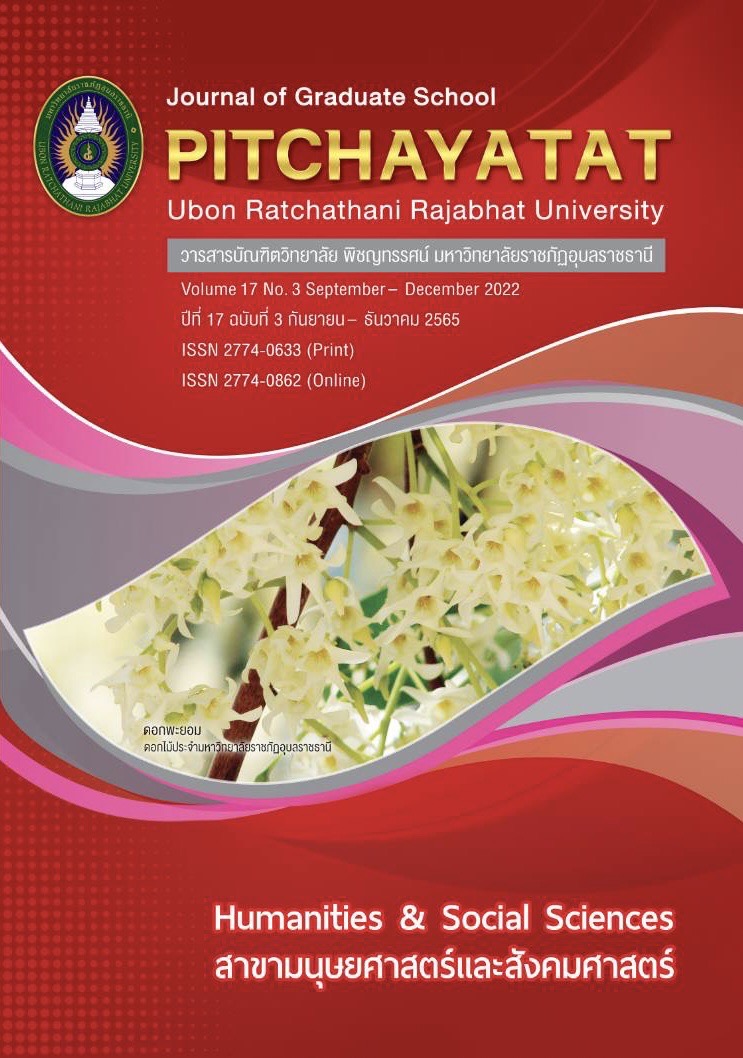A Model of Transformational Leadership Development of School Administrators Affecting the Relationship between Schools and Communities under the Secondary Educational Service Area Office Loei Nongbualamphu
Keywords:
A Model, Transformational Leadership, Relationship between Schools and CommunitiesAbstract
The objectives of the research were 1) to study the variables of the transformational leadership affecting the relationship between the schools and the communities under the Secondary Educational Service Area Office Loei Nong Bua Lam Phu, 2) to create a model of the development of the transformational leadership affecting the relationship between the schools and the communities, and 3) to evaluate the model of the development of the transformational leadership affecting the relationship between the schools and the communities. The research was conducted into three phases. The first phase was to study the variables of the transformational leadership affecting the relationship between the schools and the communities. The samples were 291 participants consisting of the school administrators and the teachers teaching the secondary schools in Loei Province. The sample size was determined by using Krejcie & Morgan’s Table. The samples were randomized by cluster sampling based on the school sizes and simple sampling by drawing lots to obtain the samples. The research instrument was a five-rating scale questionnaire with the reliability of the whole questionnaire of .95. The second phase was to create a model of the development of the transformational leadership affecting the relationship between the schools and the communities. The creation of the model was divided into 2 steps. The first step was to investigate a multiple case study by using semi-structured interview. The samples were 3 school administrators from the secondary schools in Loei Province. They were selected by purposive sampling. The second step was to do group discussion. The samples were the stakeholders and people involving in doing the research to confirm the data. The third phase was to evaluate the model by 5 experts. The statistics used in the research were percentage, mean, standard deviation, correlation analysis, and multiple regression. The qualitative data were analyzed by content analysis.
The research findings were as follows.
- The transformational leadership could be used to predict the relationship between the schools and the communities. It consisted of 4 components: 1) individualized consideration, 2) intellectual stimulation, 3) being role models, and 4) the creation and the communication of the vision.
- The model of the development of the transformational leadership affecting the relationship between the schools and the communities consisted of 5 components: 1) the name of the model, 2) the principles and the importance of the model, 3) the objectives of the model, 4) the components of the model, and 5) the methods to use the model and the conditions for success consisting of 11 components of the development, 31 methods of the implementation, and 41 conditions for success.
- The findings of the evaluation showed that the model of the development of the transformational leadership affecting the relationship between the schools and the communities in the overall was at the highest level.
References
กัญญารัตน์ สุขแสน. รูปแบบการพัฒนาภาวะผู้นำด้านดิจิทัลของผู้บริหารโรงเรียนในเครือมูลนิธิคณะเซนต์คาเบรียลแห่งประเทศไทย. วิทยานิพนธ์ศึกษาศาสตรดุษฏีบัณฑิต มหาวิทยาลัยรังสิต, 2564.
ชูชาติ พ่วงสมจิตร์. “การสร้างความสัมพันธ์ระหว่างโรงเรียนกับชุมชน,” Veridian E-Journal, Silpakorn University ฉบับภาษาไทย สาขามนุษยศาสตร์ สังคมศาสตร์และศิลปะ. 10, 2 (พฤษภาคม-สิงหาคม 2560): 1342-1354.
ฐิติพงศ์ คล้ายทอง. พฤติกรรมภาวะผู้นำการเปลี่ยนแปลงของผู้บริหารสถานศึกษาสำนักงานเขตพื้นที่การศึกษาสระบุรี เขต 1. วิทยานิพนธ์ครุศาสตรมหาบัณฑิต มหาวิทยาลัยราชภัฏเทพสตรี, 2547.
พัชรินทร์ สงครามศรี. “การพัฒนาโปรแกรมเสริมสร้างภาวะผู้นำการเปลี่ยนแปลงของ ผู้บริหารสถานศึกษา โรงเรียนมัธยมศึกษา สังกัดสำนักงานเขตพื้นที่การศึกษา มัธยมศึกษา เขต 20,” มหาวิทยาลัยราชภัฏร้อยเอ็ด. 12, 1 (พฤษภาคม 2561): 161-173
พิทูล อภัยโส. โปรแกรมการพัฒนาภาวะผู้นำการเปลี่ยนแปลงของผู้บริหารสถานศึกษาที่มุ่งสู่องค์การแห่งการเรียนรู้ของโรงเรียน สังกัดสำนักงานเขตพื้นที่การศึกษาประถมศึกษา จังหวัดนครพนม. วิทยานิพนธ์ครุศาสตรดุษฎีบัณฑิต มหาวิทยาลัยราชภัฏสกลนคร, 2557
พูลศักดิ์ จิตสว่าง. รูปแบบการพัฒนาภาวะผู้นำการเปลี่ยนแปลงของผู้บริหารสถานศึกษาในสังกัดสำนักงานเขตพื้นที่การศึกษามัธยมศึกษา เขต 1. กรุงเทพฯ: สถาบันพัฒนาครูคณาจารย์และบุคลากรทางการศึกษา, 2561.
รุ่งทิพย์ เข็มทิศ. การสร้างความสัมพันธ์ระหว่างโรงเรียนกับชุมชนของโรงเรียนเทศบาลแหลมฉบัง 3 อำเภอศรีราชา จังหวัดชลบุรี. วิทยานิพนธ์ศึกษาศาสตรมหาบัณฑิต มหาวิทยาลัยบูรพา, 2559.
รุ่งอรุณ หงษ์เวียงจันทร์. รูปแบบการพัฒนาภาวะผู้นำการเปลี่ยนแปลงในศตวรรษที่ 21 ของผู้บริหารสถานศึกษาขั้นพื้นฐาน ในเขตภาคตะวันตก. วิทยานิพนธ์ปรัชญาดุษฏีบัณฑิต มหาวิทยาลัยราชภัฏกาญจนบุรี, 2560.
รัตติกรณ์ จงวิศาล. ภาวะผู้นำ (Leadership) ทฤษฎีการวิจัยและแนวทางสู่การพัฒนา. พิมพ์ครั้งที่ 2. กรุงเทพฯ: สำนักพิมพแหง่จุฬาลงกรณ์มหาวิทยาลัย, 2556.
วัชรพล โพธิ์พูนศักดิ์. ภาวะผู้นำการเปลี่ยนแปลงที่ส่งผลต่อการเป็นองค์กรสมรรถนะสูงขององค์กรรัฐวิสาหกิจ. วิทยานิพนธ์รัฐประศาสนศาสตรดุษฏีบัณฑิต มหาวิทยาลัยชินวัตร, 2563.
ศศิธร รักษาชนม์. ปัจจัยที่ส่งผลต่อภาวะผู้นำการเปลี่ยนแปลงของผู้บริหารสถานศึกษา สังกัดสำนักงานเขตพื้นที่การศึกษามัธยมศึกษา เขต 30. วิทยานิพนธ์การศึกษามหาบัณฑิต มหาวิทยาลัยมหาสารคาม, 2557.
ศึกษาธิการ, กระทรวง. แผนการศึกษาแห่งชาติ พ.ศ. 2560–2579. กรุงเทพฯ: สำนักงานเลขาธิการสภาการศึกษา, 2560.
สุกัญญา พูลกสิ. ความสัมพันธ์ระหว่างภาวะผู้นําการเปลี่ยนแปลงของผู้บริหารสถานศึกษาและวัฒนธรรมองค์การตามความคิดเห็นของครูผู้สอนในสถานศึกษา สังกัดสำนักงานเขตพื้นที่การศึกษามัธยมศึกษา เขต 18. วิทยานิพนธ์ครุศาสตรมหาบัณฑิต มหาวิทยาลัยราชภัฏรําไพพรรณี, 2557.
สุชาดา รังสินันท์. เอกสารการสอนชุดวิชาการบริหารการเปลี่ยนแปลงหน่วยที่ 10 : ผู้บริหารกับการเปลี่ยนแปลง. นนทบุรี: มหาวิทยาลัยสุโขทัยธรรมาธิราช, 2550.
สุเทพ สังกะเพศ. ความสัมพันธ์ระหว่างคุณลักษณะของผู้บริหารสถานศึกษากับการมีส่วนร่วมของชุมชนในการจัดการศึกษาสังกัดสำนักงานเขตพื้นที่การศึกษาอุบลราชธานีเขต 1. วิทยานิพนธ์ครุศาสตรมหาบัณฑิต มหาวิทยาลัย ราชภัฏอุบลราชธานี, 2550.
สุมาลี มาเจริญ. แนวทางการพัฒนาภาวะผู้นำการเปลี่ยนแปลงที่ส่งผลต่อความรับผิดชอบต่อสังคมของธุรกิจรีไซเคิลในกรุงเทพมหานครและปริมณฑล. วิทยานิพนธ์ครุศาสตรมหาบัณฑิต มหาวิทยาลัยราชภัฏนครปฐม, 2564.
อารีรัตน์ จุ้มใหม่. รูปแบบการพัฒนานวัตกรรมสร้างสรรค์ทางสังคมในโรงเรียนขนาดเล็ก สังกัดสำนักงานเขตพื้นที่การศึกษาประถมศึกษาอุดรธานี เขต 2. วิทยานิพนธ์ศึกษาศาสตรมหาบัณฑิต มหาวิทยาลัยขอนแก่น, 2560.
Andriani, S., N. Kesumawati and M. Kristiawan . “The Influence of The Transformational Leadership And Work Motivation On Teachers Performance,” International Journal of Scientific & Technology Research. 7, 7 (July 2018): 19-28.
Bass, B. M. and Avolio. B. J. Improving organizational effectiveness through transformational leadership. Newbery Park, CA: Sage, 1994.
Craft, R. C. “Community attitudes toward education and levels of participation in school affairs,” Dissertation Abstracts International. 49, 7 (February 1978): 1633-A.
Grossi, D. L. “The role of superintendents in engaging the public in defining the goals of education,”Dissertation Abstracts International. 61, 11 (November 2001): 4241 - A.
Zhu, W., B. J. Avolio and F. O. Walumbwa. “Moderating role of follower characteristics with transformational leadership and follower work engagement,” Group & Organization management. 34, 5 (March 2009): 590-610.
Downloads
Published
How to Cite
Issue
Section
License
Copyright (c) 2022 Journal of Graduate School, Pitchayatat, Ubon Ratchathani Rajabhat University

This work is licensed under a Creative Commons Attribution-NonCommercial-NoDerivatives 4.0 International License.
Every article is peer-reviewed for academic correctness by at least three external qualified experts. The opinions in the Pitchayatat Journal (Humanities and Social Sciences) belong to the authors; not belong to the Publisher. Thus, Pitchayatat Journal cannot to be held responsible for them. The articles in this journal are protected by the copyright of Thailand. No part of each issue may be reproduced for dissemination without written permission from the publisher.





